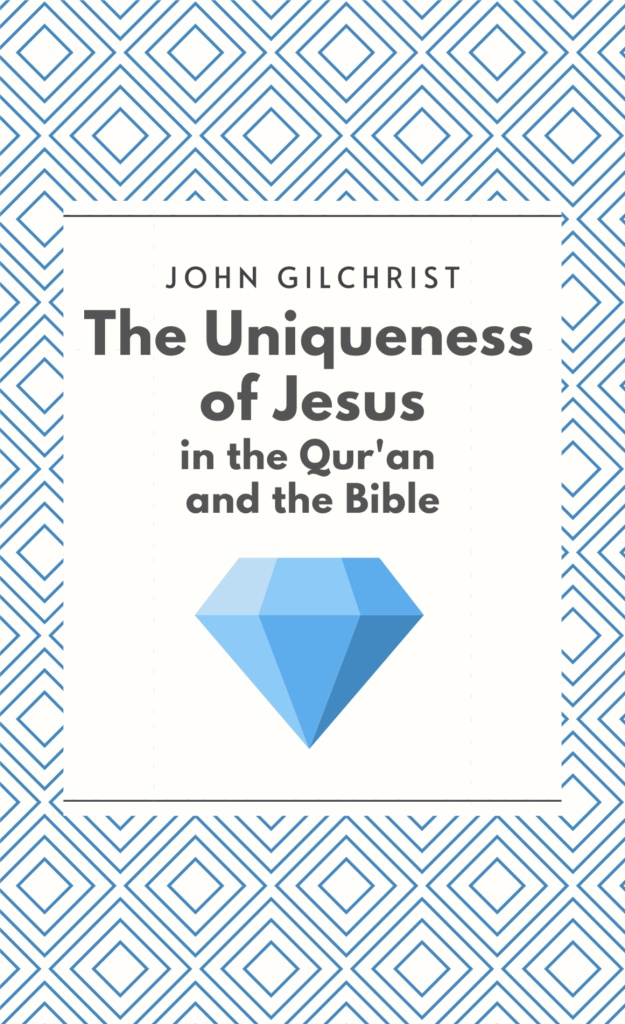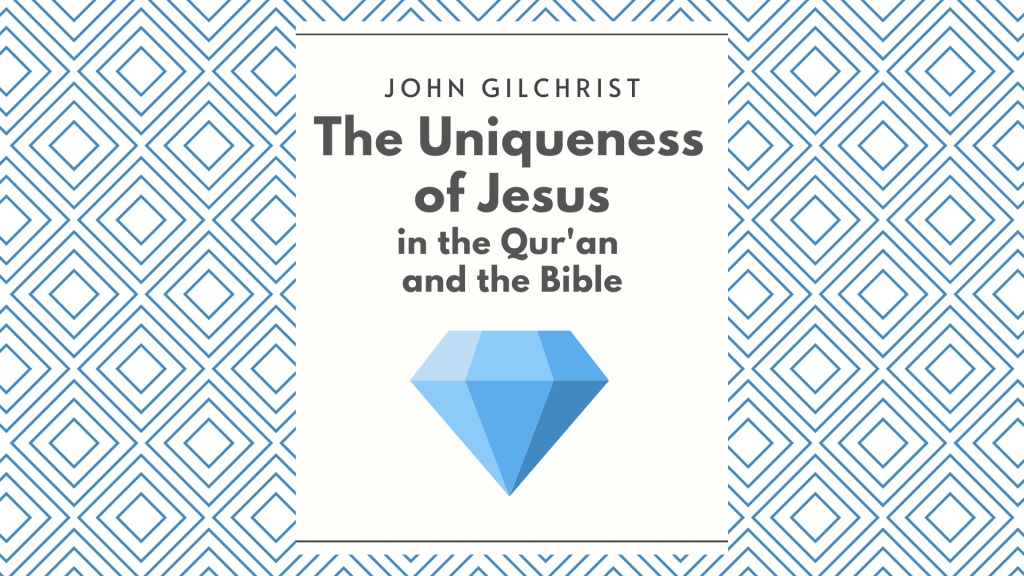The Uniqueness of Jesus in the Qur'an
The Uniqueness of Jesus in the Qur'an and the Bible


Chapters
« Ch. 8 - Implications of the Uniqueness of Jesus
We shall consider the four unique features of the life of Jesus as they appear in the Qur'an to discover whether we obtain any light on their significance.
a). The Virgin-Birth.
The Qur'an treats the birth of Jesus purely as an expression of God's power and declares that it is no more significant than the creation of the first man Adam. We read:
She said: My Lord! How can I have a child when no mortal hath touched me? He said: So it will be. Allah createth what He will. If he decreeth a thing, He saith unto it only: Be! and it is. Quran 3.47
Lo! The likeness of Jesus with Allah is as the like- ness of Adam. He created him of dust, then He said unto him: Be! and he is. Quran 3.59
The second verse does not directly refer to the virgin-birth but by comparison with the first it is quite clear that this is what the Qur'an has in mind. In both verses the Qur'an teaches that Jesus was created and that this was purely a manifestation of God's power. In the second verse we read that his creation is neither different to nor more wonderful than that of Adam.
Let us briefly consider these two points. Firstly, is the virgin-birth just an expression of God's power? That it was brought about by the power of God goes without saying but this does not explain its meaning or purpose. Surely the great act of creating the whole world out of nothing, and the other allied facts of creation (the giving of life to men, animals, and other creatures) are sufficient proofs of God's creative power. What necessity was there to give a new demonstration of this power? In the Qur'an there are many occasions where Muhammad is told that, if the people will not believe in God despite all the evidence present in creation, nor will they believe if new portents and signs come to them. (See Surah 6. 1-41, for example). So likewise the Qur'an teaches that no proof of the ultimate resurrection is needed for the unbelievers - the mere fact that God could create men out of nothing is surely proof that God can raise them from the dead (Quran 22.5). So we also consider that the creation itself is sufficient evidence of God's creative power - and if men will not believe in him despite this evidence, no latter portent will be able to make them do so. The virgin-birth of Jesus cannot just have been a manifestation of God's power. Indeed it would require only a very limited exercise of this power to cause it and there was also no visible demonstration of it. The virgin-birth could not be physically proved - there was no visible evidence of it. We accept it as a fact by faith in God's word that it did indeed so happen. But there was no way of physically proving it. Therefore we conclude that the virgin-birth could not have been an arbitrary demonstration of the power of God for the visible demonstration is entirely lacking. There must have been another reason for it.
Secondly, we must consider the suggestion in the Qur'an that the birth of Jesus is no different to the creation of Adam. We will immediately agree that, as an expression of the power of God, the virgin-birth is indeed no more wonderful than the creation of Adam. Rather it required a negligible exercise of this power in contrast to the creation of Adam, but this suggests all the more that there was some other purpose behind it.
What was the necessity for the virgin-birth of Jesus? God surely does not do such unusual things arbitrarily if they are unnecessary. He would surely only cause the virgin-birth if it were necessary to do so. Something must have required that Jesus be born in this way.
The comparison with Adam does not help us at all. Adam was created out of dust and could not have had a father or mother - it was necessary that the first man should be created without father or mother. But Jesus was born of a woman when the creative work of God had long ceased and the pro-creation of the human race had long been in existence. We can see why it was necessary for Adam to be created without father or mother - but what was the necessity for Jesus to be born of a mother alone? The comparison with Adam does not answer this question at all.
This question really demands a thorough answer when we put it in this way: why was Jesus born of a virgin - and no one else? Why should the mother of Jesus be the most eminent woman in the Qur'an and the Bible rather than some other woman? Compare these two verses:
"Blessed are you among women, and blessed is the fruit of your womb". Luke 1:42
And when the angels said: O Mary! Lo! Allah hath chosen thee and made thee pure, and hath preferred thee above all the women of creation. Quran 3.2
These verses unambiguously teach that Mary was the greatest woman who ever lived. Why was this? Because she was the virgin-mother of Jesus. She was the greatest among women because she mothered the greatest among men. All this demands that there was something extremely unique about her son - and that this uniqueness in some way made it necessary for Jesus to be conceived and born of a virgin-woman.
The only clue the Qur'an gives us is that the purpose of the angel's visit was to bestow on her a "faultless son". Somehow this exceptional holiness of Jesus made the virgin-birth necessary. But this only leads to the next feature that, with the others, leads up to the conclusion of the uniqueness of Jesus and does not actually reveal what that uniqueness was. But let us press on and see what light we can obtain.
b). The Sinlessness of Jesus.
Why should Jesus be the only man who was without sin among men? The Qur'an admits his sinlessness but gives us no reason for it. The fact that he was a prophet does not answer our question Other prophets are not described in the Qur'an as faultless and quite a few are shown to be wrongdoers. But we must again ask - why was Jesus sinless and not other men? We could understand that he was only a messenger if he had one unique feature while all the other prophets had exceptional features of their own. But all these unique features are vested in one man at the expense of all the others - and that man is Jesus. Here again the Qur'an does not reveal what made Jesus so unique.
c). The Ascension of Jesus.
The Qur'an only gives one reason for the ascension of Jesus - God took him to heaven to save him from the murderous intentions of the Jews. But this hardly explains why God has elected to enjoy the presence of Jesus for nearly twenty centuries. If the sole purpose was to save him from the Jews, why did he not send him back when those who sought his life were dead? Surely God could have found more mundane way of delivering Jesus if he was just a messenger like those who went before him. This was surely a most extraordinary and drastic way of saving him from the Jews.
We have concrete support for this argument from the Bible for shortly after Jesus was born, Herod, the King of Judea, sought his life when word came to him that the long-awaited Messiah had been born in Bethlehem. Immediately an angel appeared to Joseph in a dream, saying:
"Rise, take the child and his mother, and flee to Egypt, and remain there till I tell you; for Herod is about to search for the child to destroy him". Matthew 2:13
Joseph and Mary duly left for Egypt by night with the child. But when Herod died shortly afterwards, the angel again came to Joseph, saying:
"Rise, take the child and his mother, and go to the land of Israel, for those who sought the child's life are dead". Matthew 2:20
Surely God could have adopted a similar procedure the second time if he intended to rescue Jesus from the Jews. We must reject the theory that Jesus was taken to heaven solely as an escape-route from the hands of the Jews. Those who sought his life perished nineteen centuries ago, but God remains pleased to keep Jesus in his presence in heaven and has done so over all these generations since he ascended from the earth.
We can only conclude that it was the express purpose of God to raise Jesus to heaven in any event and that he most certainly did not do this purely to save him from the hands of the Jews. We must again ask - why did Jesus ascend to heaven, and not some other man? (John 3:13). Why did God will, between the time of the life of Jesus on earth and the end of time, that Jesus should reign with him in glory in the highest heavens? With all due respect we are constrained to conclude that the Qur'an gives us no answer to this question.
d). The Second-Coming.
Why has God chosen Jesus to bring the whole world under his control? Why not Muhammad? Why will he not raise another man but instead has elected to vest Jesus with another glorious office that transcends any of those given to the other messengers?
Far from answering questions like these, the Muslim world has, in our view, devoted itself to efforts to ex- plain away the uniqueness of Jesus rather than disclose wherein it consists. This tendency to explain away the glory of Jesus rather than investigate it can only lead to the path of error.
The wonderful birth of Jesus was caused by God's direct intervention. His whole life was one of absolute communion with God. The same God vested Jesus with majesty and glory by raising him to heaven and has decreed that he will be the herald of God's final sentence on all human history. Does not this pattern demand that there is something particularly glorious about the person of Jesus to knit all these unique features together? Surely they are all meaningless if Jesus was only a prophet and a messenger from God.
These circumstances are collective evidence that there is something majestic about the man Jesus but whatever it is, the Qur'an is silent on the matter. Why is this so? The answer is found in what follows. The Qur'an is known to the Christian world not so much for what it admits about Jesus but for what it denies about him. The Qur'an denies that Jesus is the Son of God and it denies that he was crucified. In our view - and we say this solely with respect to our right to state what we believe to be true and with no desire to cause offence - the Qur'an, by denying these two striking point about Jesus, has simultaneously robbed all the unique features it concedes of their significance. We shall proceed to behold how all these unique features harmonize and find their meaning and significance in the two fundamental doctrines of Christianity - that Jesus is the Son of God and that he died for our sins.